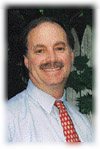![]()
![]()

From America's Network, September 1, 1999
http://www.americasnetwork.com/issues/99issues/990901/990901tool.htm
I am ashamed to admit that I played a small part in creating the technology behind interactive voice response (IVR). I kick myself every time I find myself on hold, a prisoner of some idiot robot announcement.
At the same time, I delight as the Internet, using audio technology with the same signal-processing roots as IVR, shatters the star-maker machinery of the recording behemoths. I exult when my cable modem bypasses the ever more homogenized, monopolized, risk-averse broadcast media to pull in an MP3 by a jazz artist I’ve never heard before, or a .wav of a Grateful Dead concert from 1972 or a RealAudio stream of traditional Polynesian music from KKCR radio Kauai.
I am ashamed that my amazon.com purchases make me complicit in this month’s closing of not one, but two small bookstores in Westfield, N.J. And I share guilt for this year’s loss of The Market Bookshop in Falmouth, Mass., which was a labor of love by its owners Bill and Caroline Banks that added much more value to my life than I ever paid them for.
At the same time, I think that amazon.com embodies the promise the future, and that Jeff Bezos is a genius. Online shopping frees me from depersonalized megastores. It keeps me out of my car. It bespeaks a radical discontinuity in retail that promises to make expanded arrays of goods and services available to — and affordable by — more people.
Technology has always been a two-edged tool. We who have sweated to hack our way onto the early Internet, who now depend on it in our daily lives, find it a bit too easy to feel virtuous. Todays’ incredible market valuations provide external vindication that makes it even easier.
We may not welcome the other edge of communications technology. We may even deny that it will cut. Nevertheless, it is swinging our way; the money-come-lately has arrived. Before our eyes, the Internet Engineering Task Force (IETF; only yesterday a functioning meritocracy) warps into a political forum where incumbents position and feint. The Internet Corporation for Assigned Names and Numbers (ICANN, conceived only last year as an open body dedicated to Internet self-governance) becomes a back room filled with today’s equivalent of cigar smoke. And AT&T’s unfettered foray into broadband monopoly (in the name of competition and deregulation) could strangle the next swarm of harebrained value creation in a silk web of economic justification.
A reminder that technology is but a tool in the hand of humanity arrives in my e-inbox every few weeks. It is a five-year old ‘zine called Netfuture: Technology and Human Responsibility, edited and written (for the most part) by Stephen L. Talbott. Netfuture, distributed to about 4,500 readers, provides a consistent, moderate voice, reminding us, in Talbott’s words, that "we need to move to a deeper level of analysis."
For example, in Netfuture #91 (June 23, 1999), Talbott queries, "[I]f you lived at the beginning of the 20th century and if, possessed of unusual foresight, you had grave misgivings about how the automobile was beginning to restructure society, what would your message to your contemporaries have been? … How would the automobile itself contribute to overall patterns of injury and health? How would it play into our besetting tendencies to abandon community and flee ourselves? How would it help to fragment and ghetto-ize society?" Talbott continues, "you might find yourself [saying] ‘You know, the more we as a society rely on this machine with our current imbalances, the more we will, even with our good deeds, strengthen certain forces that bring pain and suffering to society.’"
As we rush to computerize our schools, Netfuture reminds us that learning is about more than "shovelable … atomic facts" — that the deepest education comes from one human’s faith in another. As we build new communications and applications, Netfuture affords a pause in the business buzz to reflect on the decontextualization that comes when the answer to "Where do you want to go today?" is whimsical, and technology transports us at will. And as prostheses for blindness gain efficacy, Netfuture points out that new ways of seeing, developed by an individual’s willful conscious effort, need neither light nor retina to know aspects of our world that the sighted never see.
Broadly, I believe that technology in the hand of humanity is good, and especially that open systems will empower the disenfranchised and capitalize the undiscovered. But in these days of heady progress, it is worth remembering that we build on the ageless legacy of our environment, our biology and our psychology, which may not respond as we wish when we increase the density of transistors and the speed of bits.
To learn more about Netfuture, see http://oreilly.com/~stevet/netfuture/.
For more on David S. Isenberg, see www.isen.com.
Copyright 1999 Advanstar Communications.